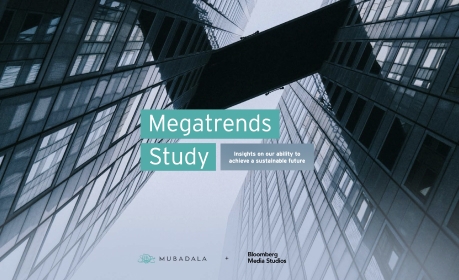Understanding Megatrends
Can Take the Fear Out of the Future:
Five trends of our time are affecting the way we live and work





These powerful, transformative forces, or megatrends, are perceived in different ways by different age groups. Younger generations have grown up in the internet age, but their formative years have been marred by the 2008 financial crisis and the ensuing recession, and then the Covid-19 pandemic. The current generation of senior professionals have also faced their own challenges during these global milestones.
Crises such as the war in Europe, spiraling energy prices and a looming recession in the world’s biggest economies are directing our attention to the challenges of the present. In the midst of such uncertainty, the future can seem unpredictable, which is why discussing megatrends is more vital today than ever; forcing our gaze forward to understand these forces of change can help us prepare for what is to come.
Bloomberg Media’s Megatrends Study, sponsored by Mubadala, explores how the experiences of various demographic groups shape their perspectives and expectations of megatrends. Based on our survey of 1,800 investors, engaged and informed millennials, and Gen Z consumers, the study delivers a comprehensive global view of the megatrends landscape, and what to expect by the end of the decade.


4 KEY TAKEAWAYS
01
Megatrends are important today, and will remain so moving forward
02
The sentiment around megatrends is optimistic today, and that optimism increases for 2030
03
Digital Technologies and Climate Change will play the biggest roles in defining our future
04
Companies’ success depends on their response to megatrends
01
There is a high degree of alignment across Bloomberg’s survey respondents about the importance of megatrends to achieving a sustainable future — 73% to 81% of all audiences view megatrends as important in achieving this goal today, and for 2030 as well.
02
As for how they feel about the impact of megatrends on our ability to achieve a sustainable future, while all audiences are optimistic overall, investors are more so than millennials or Gen Z. That could be because they feel more confident about responding to megatrends through their strategies (91%) than either Gen Z (77%) or millennials (73%), implying that the ability to put capital behind their decisions contributes to their sense of empowerment.
03
Respondents agree that Digital Technologies is the megatrend that’s most critical for human progress, and that Climate Change represents the greatest risk to our well-being.
When it comes to assessing which megatrends are most critical for progress, those surveyed resoundingly agree that Digital Technologies is the megatrend most likely to advance the well-being of the general population. That’s not surprising, given the speed at which we’re adopting technology across all aspects of our lives. In 2017, there were 27 billion internet-connected devices worldwide, ranging from smart phones to home thermostats and vehicles. The number is expected to be 125 billion by 2030. Indeed, the metaverse is poised to spark as much of a revolution as the internet boom of the 1990s, as it progresses from its current model as largely a space for gaming to become a parallel, virtual world where people also gather and consume.


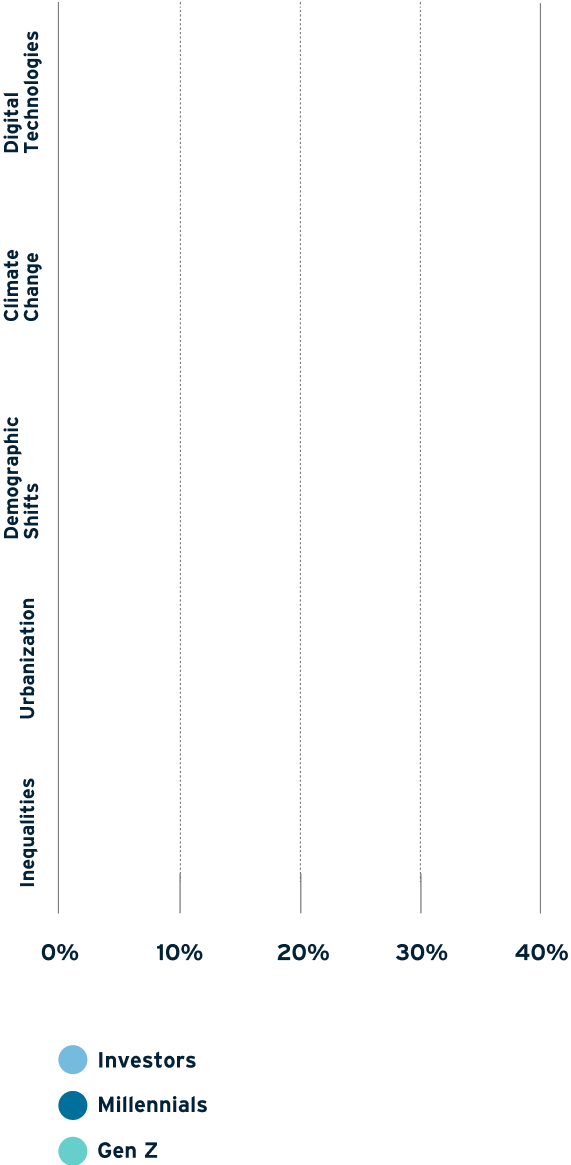

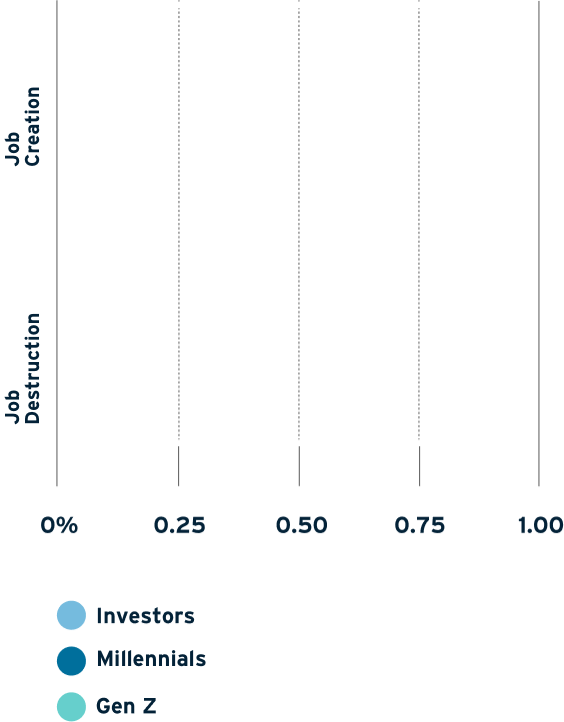
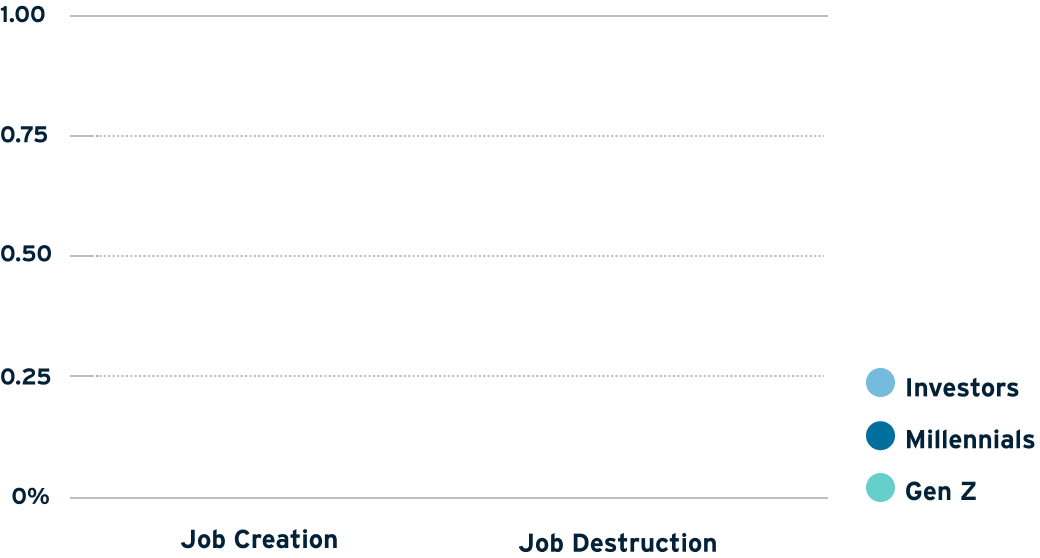
Given this context, it is perhaps understandable that respondents also concur that in the long run, automation will be a net positive for society, as it is making lives easier and has the potential to transform it completely the way the worldwide web did last century. The survey shows that more agree that Digital Technologies create more jobs than they eliminate. That’s in line with World Economic Forum estimates that by 2025, technology will create at least 12 million more jobs than it destroys.
In contrast, other megatrends generate a deep sense of vulnerability among respondents. When asked which of the five represents the greatest risk to well-being, Climate Change tops the list by far. Millennials see Climate Change (45%) as an even greater risk than Gen Z (38%) or investors (36%). This is likely because they have the most at stake; they’re the largest portion of the workforce today in the US, the world’s biggest economy, and represent a net worth of $9.4 trillion. Almost 90% of US millennials recognize that man-made climate change is happening, including those on the political right, which is usually more prone to dismiss human influence on the environment.


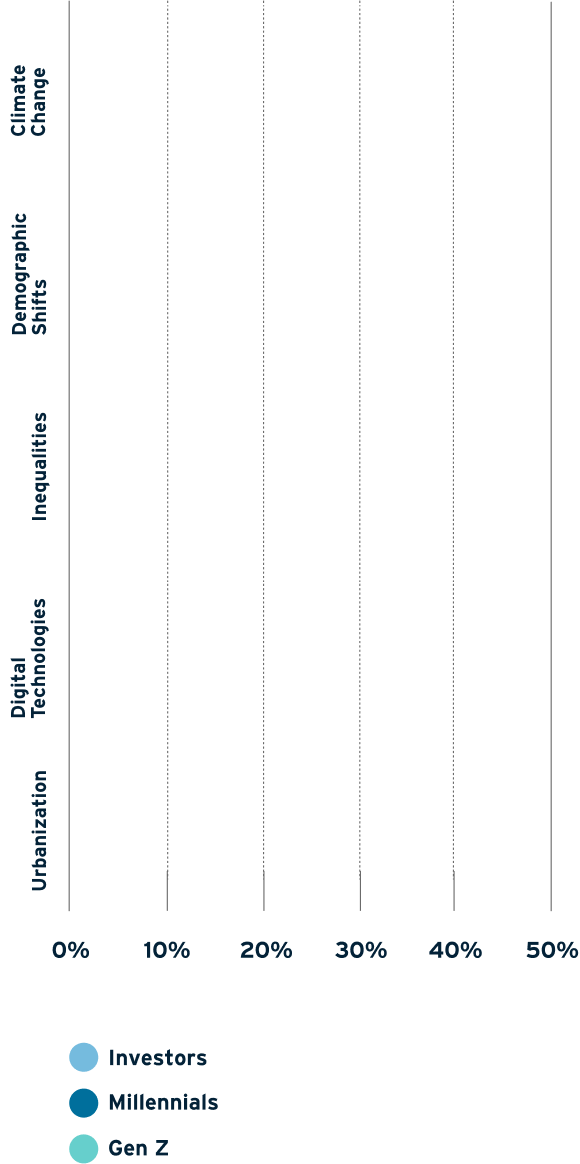

04
Companies must integrate megatrends into their business strategies, whoever may be their audience or stakeholder.
While organizations like the United Nations and the world’s leaders are laser-focused on megatrends, our audiences expect the same from the world’s companies. Investors, millennials, and Gen Z strongly agree that companies need to integrate megatrends into their business strategies to improve overall performance. What’s more, our respondents agree that companies who do not do so will be left behind.


However, audiences are split when it comes to performance. While millennials score the importance of a company’s response to megatrends in evaluating performance higher than investors, 96% versus 91%, Gen Z stands apart, with just 67% believing that a company’s response impacts its performance. Our youngest respondents are the most disheartened at the level of inaction they perceive by those in power to these vast, transformational megatrends, and feel powerless to do anything about it. Indeed, the World Economic Forum’s 2021 Global Risks Report listed “youth disillusionment” as one of the top blind spots that could cause significant negative impacts in the coming years.








As our audiences concur, each of these megatrends has the power to change the trajectory of society — and the global economy
While Digital Technologies and Climate Change will play the biggest roles in defining our future, they do not need to follow the same path in terms of their evolution. Digital Technologies, along with Demographic Shifts and Urbanization, may be inevitable as they are part of human progress, but they can be guided to ensure they deliver positive impacts, according to the United Nations. Climate Change, however, as well as Inequalities, are avoidable; caused by policy failures, they can be mitigated.
All five, then — each one the result of human activity — can be shaped by human decisions and policy choices. It is thus critical for businesses to understand how various demographic groups will respond and what their expectations are, as these responses can shift political, economic, and social priorities.
MUBADALA’S STRATEGY
Mubadala is a sovereign investment company based in Abu Dhabi that invests in a wide range of industries including technology, aerospace, renewable energy and healthcare. Its strategy is based on identifying the megatrends that are shaping the global economy and investing in the long-term growth opportunities they create.
A key megatrend for Mubadala is the transition to a low-carbon economy. Through investments in renewable energy and sustainable infrastructure the company is positioning itself to contribute to finding solutions to this challenge. Mubadala is also implementing ESG principles throughout its investment lifecycle.
Mubadala is also closely monitoring demographic shifts and increasing urbanization, which will shape new market dynamics, requiring innovative solutions in healthcare and fintech and to meet the needs of new generations of consumers.
Ahmed Saeed Al Calily, Chief Strategy and Risk Officer, Mubadala, said: “As a responsible investor, we continue to execute our strategy factoring in megatrends and other dynamics, and in line with our convictions on asset classes, sectors and geographies. This has seen us make a range of investments in the energy transition, traditional and digital infrastructure, life sciences, and technology to achieve value creation while delivering a positive impact to communities and contributing to a sustainable future.
“At Mubadala, we are embracing our role as a convener of the finance community to help find solutions to the world’s biggest problems. The key takeaway from this study is that by making the right choices today, it is not too late to shape these trends and set the stage for an inclusive, sustainable and equitable future for all.”
Recent investments
Mubadala's investments in disruptive technologies
Mubadala acquires stake in Abu Dhabi carbon exchange
Mubadala and technology company G42 merge healthcare businesses
Mubadala Petroleum rebrands as Mubadala Energy to reflect energy transition goals
Mubadala invests in Tata Power renewable energy businesses
Mubadala to invest $350M in pan-Asia data center company Princeton Digital Group
